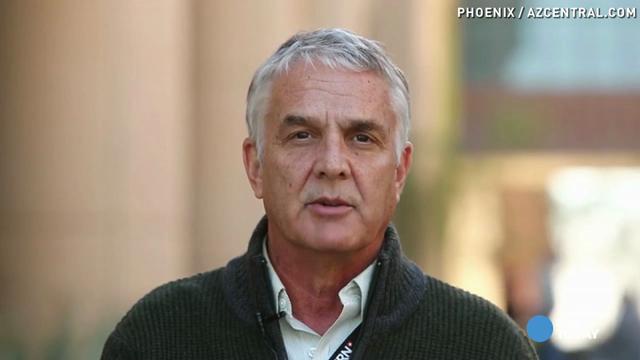Jodi Arias trial: Debate over deleted porn heats up

The debate over who deleted pornography from murder victim Travis Alexander's computer — if there was any porn on the computer — took another turn Thursday as Jodi Arias' defense lawyers filed a response motion to the prosecutor's counter claims made earlier this week.
Attorney Jennifer Willmott answered prosecutor Juan Martinez' assertion that he had been given a copy, not of Alexander's computer hard drive, but a hard drive from "an individual named Tony (who) has nothing to do with this case."
The wrong drive was apparently sent by the technician or his company. The proper one was sent after Martinez filed his motion.
According to Willmott, "Tony" was a technician charged with making the copy of the original hard drive onto a different brand computer for the prosecution.
Martinez also claimed that the defense had damaged the computer; Willmott said that the damage was already done.
"A disturbing pattern of damaged and missing evidence is emerging after a recent review of multiple items that have been held in state custody over the past 6 years," she said in her motion.
Martinez also asserted that it would have been impossible for there to be any pornography on the computer, claiming that anti-virus programs installed by Alexander would have blocked access to the sites in the first place. Martinez said that any porn would have come from the viruses found on the computer.
Willmott responded that the anti-virus program was something downloaded free from the Internet, and that the computer owner, presumably Alexander, used it to clean up afterward, without the desired results.
"There were thousands of pornography site hits found on Mr. Alexander's computer," Willmott wrote in her response. "Some were caused by viruses and some were accessed prior to viruses being downloaded onto his computer," she wrote.
"The type of viruses found on Mr. Alexander's computer are severe, and typically associated with the computer user visiting pornography sites."
Arias is on trial in Maricopa County Superior Court to determine whether she should go to death row or spend life in prison for Alexander's 2008 murder.
During her tumultuous 2013 guilt-or-innocence trial and during the present sentencing trial, Martinez repeatedly asked Mesa Police officers under oath if there was any pornography on Alexander's computers. They repeatedly said no.
Arias had alleged, among other things, that she walked in on Alexander, her sometime, secret lover, while he was masturbating to photographs of young boys. Martinez ridiculed the allegation.
On Nov. 10, Willmott and her co-counsel Kirk Nurmi filed a motion to dismiss the death penalty or even Arias' conviction because of prosecutorial misconduct. After re-examining the computer, they alleged that thousands of pornographic images had been deleted from its hard drive on June 19, 2009, while it was in police possession.
Martinez quickly countered that the time of deletion was when Arias' original legal team, Maria Schaffer and Greg Parzych, were examining the evidence. He posited that if there was any porn on the computer, it had been deposited there by computer virus, and if it had been deleted, it must have been deleted by Schaffer and Parzych.
Schaffer immediately and angrily denied the accusation, saying they had only gone to get an overview of the evidence, that they were watched the whole time by Martinez and Mesa Police Det. Esteban Flores, the case agent on the Arias case. Schaffer said that Flores plugged in the computer and turned it on, not them.
Martinez also demanded that the defense send him a copy of the contested hard drive so he could verify the results, and one was provided to him. The wrong one at first.
Computer forensics are not performed on the actual computer in evidence, because it would alter the content just by powering it up.
Instead a device called a "Write-blocker" is supposed to be installed first to keep the machine from making its usual operating changes, and a mirror image is created that can be worked on without changing the hard-drive contents.
In his motion for sanctions, Martinez accused Nurmi and Willmott of stalling in turning over evidence, demanded he be given the correct computer, and asked that the motion to dismiss the death penalty be thrown out.
Martinez also said that Alexander had a computer virus-protection software program that would not have allowed Alexander to access the porn sites in question.
Willmott stuck by the assertion that Alexander's hard drive was full of porn. She referred to the testimony in the 2013 trial in which a Mesa Police forensic expert testified he looked for viruses and didn't find them.
"Moreover, the state has now admitted that many viruses were found on Mr. Alexander's computer," she wrote. "... Besides mishandling, tampering and destroying evidence on June 19, 2009, the state now admits that it proffered false testimony when (the forensics expert) testified to looking for viruses and finding none.
"This testimony was solicited knowing that Ms. Arias asserted that Mr. Alexander's computer was infected with a virus," Willmott continued. "The state used (the) false testimony to argue that Ms. Arias was lying."
Neither the prosecution nor the defense is allowed to discuss the trial beyond the motions they filed..
The Arias trial has been slowed in recent weeks, first by a Court of Appeals stay order forbidding the defense and judge from allowing witness testimony in secret until it can be argued before a panel of judges. That hearing is scheduled for Nov. 25.
The trial went on with testimony from a psychologist who was willing to testify in public about the highly sexed relationship between Alexander and Arias. But on Tuesday afternoon, the trial halted abruptly because of a personal emergency among the lawyers that is unrelated to the trial.
Testimony resumed Thursday morning.
The pornography issues will be argued in a hearing outside of the presence of the jury on Friday.